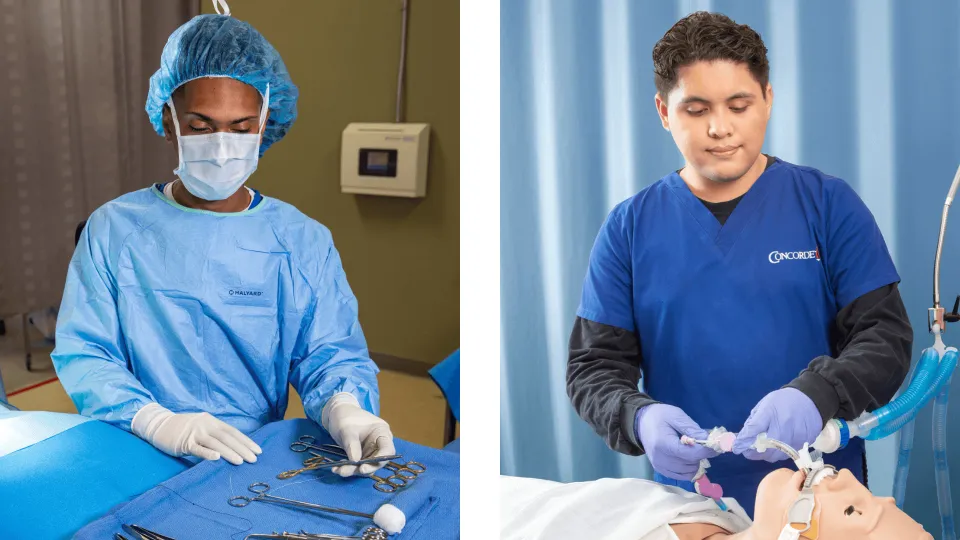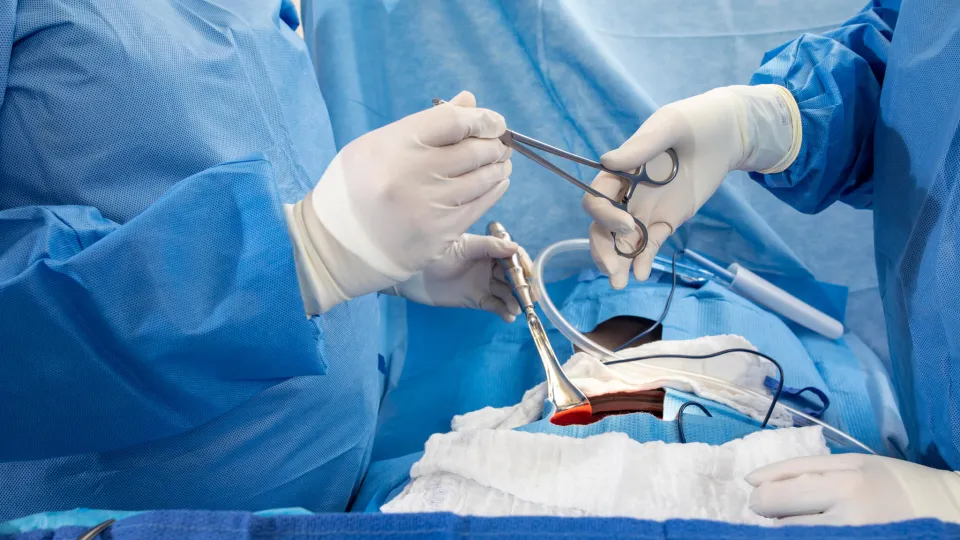
For those who are interested in a career in the health care sector, surgery is undoubtedly one of the most dynamic and rewarding fields. This is the reason why surgical technology is a very popular career track. The main goal of a surgical technologist is to ensure that surgical procedures go smoothly and to keep the patient safe. The need for adequately trained surgical technologists is also increasing as the health care industry develops.
What Does a Surgical Technologist Do?
Surgical technologists are valuable operating room team members, collaborating with surgeons, anesthesiologists, and nurses to ensure that surgical procedures are performed smoothly. These professionals are essential to maintaining sterility, preventing surgical site infection, and preparing and accounting for all surgical instruments before, during, and after a procedure. Other surgical tech job duties include:
- Preparing surgical equipment, instruments, and supplies for an operation
- Sterilizing equipment and instruments and maintaining a sterile operating field
- Assisting surgeons during procedures by passing instruments and supplies
- Checking patient charts and confirming surgical specifics
- Counting surgical tools, such as sponges, needles, and instruments
- Handling specimens for laboratory analysis
- Transporting patients to and from the operating room
- Ensuring patient's safety before, during, and after surgery
- Preparing patients for surgery, including cleaning and disinfecting incision sites
- Ensuring patient comfort and providing information
Read more: What Does A Surgical Technologist Do
Work Environments for Surgical Technologists

A surgical technologist has many career opportunities within the health care profession. More than 70% of surgical technologists work in state, local, and private hospitals as of 2022. Hospitals are dynamic environments with numerous surgical cases, ranging from general surgeries to specialized ones, such as neurosurgery, orthopedics, or cardiovascular procedures.
Outside of hospitals, many surgical technologists work in outpatient surgery centers, which specialize in scheduled, same-day surgical procedures and may offer a steadier work schedule than hospitals. Alternative work environments for surgical technologists include:
- Physician's offices and private surgical clinics
- Dental clinics
- Specialty surgical areas
Surgical technologists typically work full time, and their schedules may include:
- Nights, weekends, holidays, and on-call shifts, requiring flexibility and adaptability
- Extended hours or longer shifts than eight hours, as some surgeries can last longer than anticipated
- Physical demands, such as standing for long periods and lifting heavy surgical equipment
Surgical technologists can work in various environments, from hospitals and clinics to research laboratories, allowing them to specialize, grow, and choose a work environment that suits them.
Read more: Surgical Technologist Job Description
Education and Training Requirements
An accredited educational program that imparts theoretical knowledge and practical experience is essential in training to become a surgical technologist. Education and training requirements include:
- Certificate or diploma programs: Typically nine to 12 months in length, these programs concentrate on essential surgical technology skills, preparing students for entry-level jobs.
- Associate degree programs: These programs take about two years to complete. They provide a more comprehensive education that includes coursework on general health care, which can help with future career advancement.
- Accreditation: Many employers are looking for graduates of programs accredited by the Commission on Accreditation of Allied Health Education Programs or the Accrediting Bureau of Health Education Schools.
- Clinical externships: Hands-on training in actual surgical environments is a major aspect of a surgical technologist's education. Externships give students supervised experience in sterilization, instrument management, teamwork, and problem-solving.
- Certification: Although certification isn't always necessary, many employers favor individuals who obtain credentials such as the Certified Surgical Technologist certification awarded by the National Board of Surgical Technology and Surgical Assisting.
As surgical techniques are developed and new technology is introduced, surgical technologists must engage in lifelong learning. Ongoing education, certification in specialized practice areas, and advanced training in cutting-edge surgical techniques only improve career opportunities in this dynamic field.
Find a Surgical Technology Associate Degree Program at Concorde.
Essential Skills for Surgical Technologists

To be successful in the operating room, surgical technologists need a combination of technical skills and people skills, such as:
- Attention to detail
- Proficiency in sterile techniques and infection control
- Understanding of surgical techniques
- Strong communication and teamwork abilities
- Physical stamina
- Adaptability and quick thinking
- Manual dexterity and hand-eye coordination
- Ability to work well under pressure
- Critical thinking
- Knowledge of medical terminology and anatomy
Career Advancement Opportunities
Surgical technologists have varying career advancement options. Many specialize in specific surgical areas, such as neurosurgery, cardiovascular, or orthopedic surgery, honing their skills in challenging operations. Some choose to gain certification as a surgical first assistant, which allows them to assist surgeons in the operating room directly. Others move into management or leadership positions, such as operating room managers or surgical services coordinators, who manage surgical teams and ensure everything runs smoothly. Teaching is also an option; experienced surgical technologists move into education, training the next generation of professionals.
For those who want to transition to related health care roles, consideration should be given to further education in nursing, physician assisting, or health care administration. Surgical technologists who work in operating rooms can take on a lot of additional responsibilities. Experience combined with further education may introduce opportunities to work in research or with development teams on new surgical technologies, which all add to potential income earnings in this growing health care sector.
Job Outlook and Industry Growth
The continued growth of surgical procedures may lead to additional jobs for surgical technologists. The Bureau of Labor Statistics projects overall employment of surgical technologists to grow 5% from 2024 to 2034, which is faster than the average for all occupations. There are many reasons for this increase. The growing population of older adults is key because they need more surgical treatments, including procedures for joint replacement, cataracts, and cardiovascular problems. With the aging population, the demand for surgical technologists in hospitals, outpatient centers, and specialty clinics is projected to continue growing.
Emerging technologies, such as robotic-assisted surgeries and minimally invasive procedures, provide surgical technologists with novel career pathways. These advancements need skilled professionals who can work with innovative tools, aid in precision-based surgical procedures, and adjust to medical technologies. The growing focus on patient safety and infection control has also increased the demand for surgical technologists, as they play an important role in maintaining sterile environments and ensuring patient well-being during surgical procedures.
With this rising need, surgical technologists can expect steady job opportunities and career advancement in the field. Career opportunities are enhanced for professionals who pursue certifications, gain exposure in specialized surgical fields, or become leaders. Surgical technology continues to be a stable and rewarding career option with considerable long-term potential due to the constant advances in health care and the ongoing need for surgical services.
Surgical technology is a vital and rapidly evolving field within health care. It provides a rewarding career for those who are dedicated to patient care, precision, and working in fast-paced medical settings. With varied work environments, chances for career growth, and an increasing need for trained professionals, it's an ideal path for those wanting to make a positive difference in health care.
Take the next step toward a rewarding career in surgical technology with Concorde Career College. Gain hands-on training and the skills needed to succeed in the fast-paced world of surgery. Visit Concorde's Surgical Technology Associate Degree Program to learn more, or contact admissions today to get started on your path to a fulfilling health care career.
Surgical Technologists : Occupational Outlook Handbook: : U.S. Bureau of Labor Statistics. (n.d.). Www.bls.gov. https://www.bls.gov/ooh/Healthcare/Surgical-technologists.htm#tab-3
U.S. Bureau of labor statistics. (2018, April 13). Surgical Technologists : Occupational Outlook Handbook: : U.S. Bureau of Labor Statistics. Bls.gov. https://www.bls.gov/ooh/healthcare/surgical-technologists.htm
Take The Next Step Towards a Brighter Future
Interested in learning more about our Surgical Technology program?
We have a Concorde representative ready to talk about what matters most to you. Get answers about start dates, curriculum, financial aid, scholarships and more!








